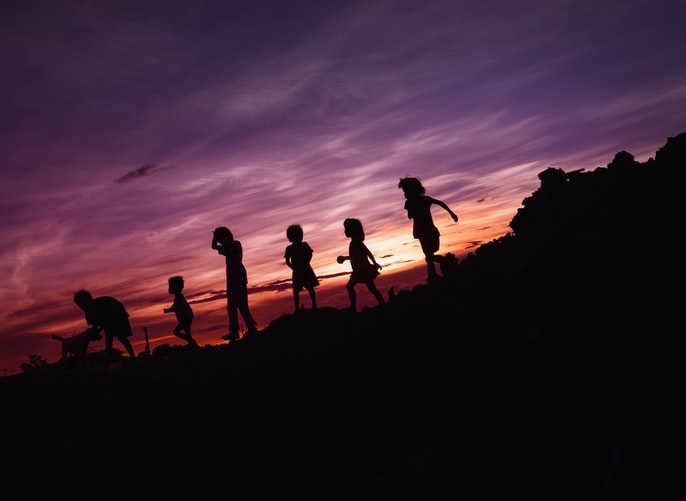News
Tiny witnesses of war: Palestinian children’s voices should guide a renewed commitment to peace

Palestinian children have borne and continue to bear the devastating effects of the never-ending conflict between Israel and Palestine.
The New York Times reported that during 11 days of fighting in May between Israel and Hamas, “at least 67 children under age 18 were killed in Gaza, according to initial reports.” Children have witnessed the unthinkable deaths of siblings, friends and family members by weapons of mass destruction and violence. Despite this, their voices and experiences go unheard.
Recalling his childhood experience, sociologist Mark Ayyash, who has studied violence, social and political theory, writes: “From the very first years of childhood, Palestinians in Gaza receive a clear message from Israel and indeed from the world: you are not human, and we do not care.”
In the article “Play Interrupted: Love Amidst Difficult Futures for the Children of Gaza,” cultural theorists Hanna Dyer and Dina Georgis argue that children are not oblivious bystanders or innocent victims in and of a war. From early childhood, they write, Palestinian children actively make meaning about their front-line experiences of the conflict.
My own research about transnational childhoods finds that children experience war and conflict much in the way adults do. But parents, teachers, helping professional adults and political leaders overlook and discount children’s immersion in armed warfare and forced displacement.
Children’s witness should challenge adults
As tiny witnesses to war, children have dreams, fantasies, feelings, thoughts, ideas and theories about it. Children capably and clearly express the unspeakable atrocities they have faced. They construct expressions, ideas and art forms from their witness. Often unknown to the adults around them, children’s embodied, playful and symbolic re-enactments send covert messages about how and what they are learning to be from violent adult conflicts.
During the recent conflict, the world heard, perhaps for the first time, from Palestinian children directly. They offered their testimony to the mass devastation and killing they witness that should challenge adults who have the responsibility and power to intervene.
In one video circulating on Twitter, two children, a boy and a girl, recount their rescue of their pet goldfish as bombs rained down on them. The children radiate with their small victory. But, the girl child’s triumph is short-lived when she realizes not everyone lived through the attack: “I wanted to save the birds but could not,” she laments as grief clouds her smiling face.
Another tweeted video shows a girl surveying the devastation piled up in the grounds she used to play on. Staring straight into the camera she dares the adult community to respond: “What do you expect me do about all of this this? Fix it? I’m only 10.”
Her question — “How can they bomb children?” — is not rhetorical. On behalf of her playmates, this child wants to know: How do we play, learn and grow up in war? Her parting words in the short video — “It’s not fair” — ought to purge world spectators of the naïve idea that children are unaware of or don’t live the consequences of war.
At the tenderest of ages, a new generation of Palestinian children are learning terribly what Fatima, a child fleeing war in Syria, knows all too well: “War is not good.” Her story is shared in the film Fatima’s Drawings.“
Appeals to adults
Through their testimony, children make unprecedented appeals to adults to hear how they acting to save themselves, their families and the world from injury, death and destruction. They feel responsible, as researcher and author Valeria Luiseli finds children do. Some take it upon themselves to find solutions for the mess adults make of their lives and their world.
Lacking political power and in their small way, Palestinian children seek to restore and redress the devastation wrought on their families, community and lives. Adults, political leaders, and teachers can learn from children of the direct effects of mass degradation and violence on their formation and over generations.
While children speak out against war for their families and lives, the world community and its leaders continue to fail to intervene in and stop the bombing where children play, learn and gather. The Associated Press reported that Egypt and Israel held talks in both countries on May 30 “to shore up a fragile truce” between Israel and Hamas and that according to the office of Egyptian Foreign Minister Sameh Shukry, talks are “part of an effort to build on an Israel-Hamas cease-fire reached May 21 and to revive Israeli-Palestinian negotiations, which have been dormant for more than a decade.”
As political leaders look to such negotiations, will children’s voices have a role?
If we learn to listen to what children are saying, the adult community might see them as people whose experiences of devastation deserve immediate action. We might then begin to heed children’s pressing demand to grow up in a world of peace, free of adult violence and war.
Aparna Mishra Tarc, Associate Professor of Education, York University, Canada
This article is republished from The Conversation under a Creative Commons license. Read the original article.





















